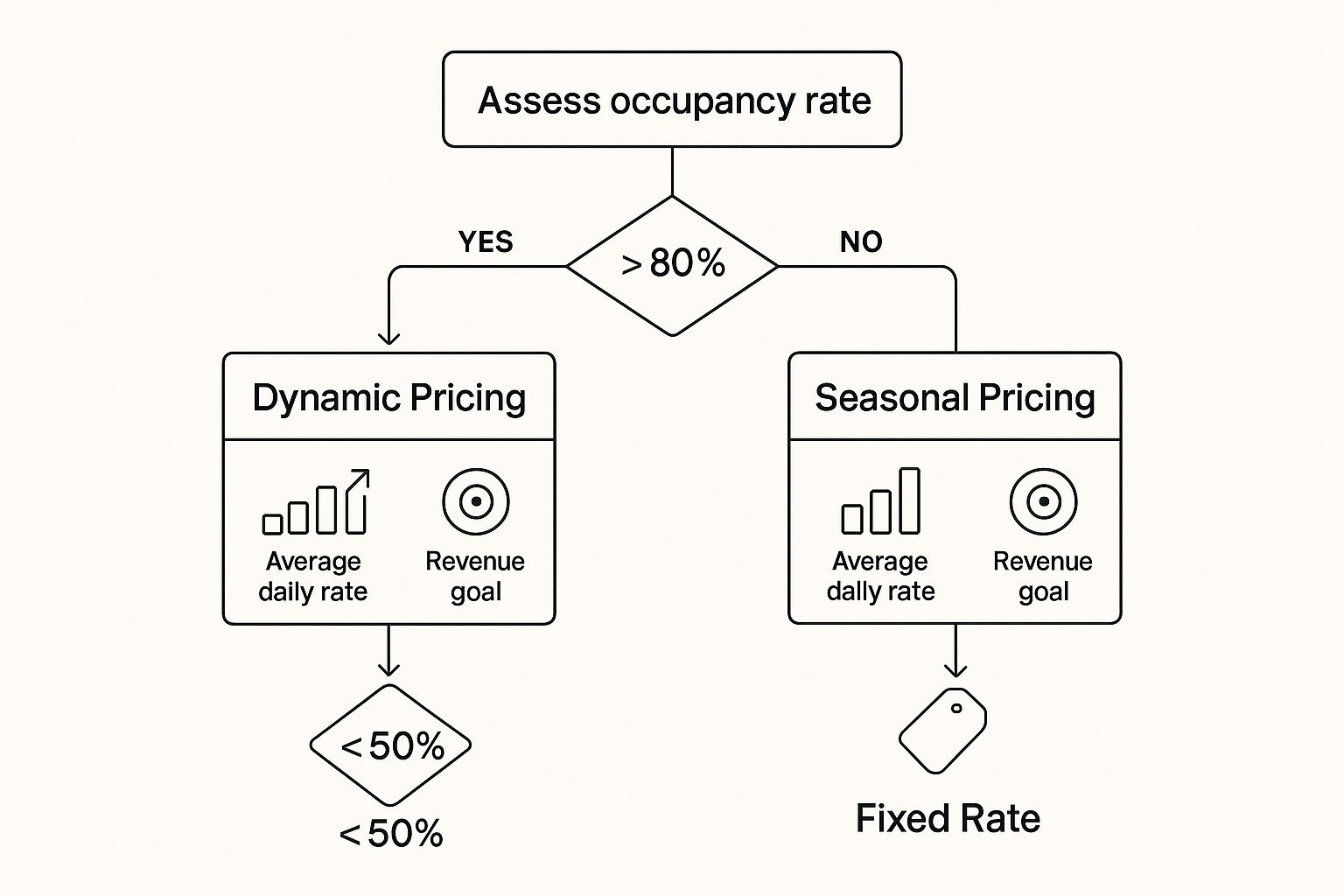Expert Property Management for Vacation Homes | Maximize Your Rental

Owning a vacation home can be an incredible investment, but managing it? That's a different story. At its core, property management for vacation homes is all about handing over the reins—turning your second home into a hands-off, high-performing business by letting an expert handle all the guest interactions, marketing, and upkeep for you.
What Is Vacation Home Property Management

Think of a great property manager as the director of your personal boutique hotel. They're not just a glorified key-holder; they are the single point of contact responsible for transforming an empty house into a profitable, five-star hospitality experience. It's a comprehensive operational system designed to make your rental run seamlessly.
This kind of professional oversight is more important than ever. The global vacation rental market was valued at around USD 94.45 billion in 2024 and is expected to climb to USD 134.26 billion by 2034. This boom is driven by travelers looking for unique, authentic stays, and professional management is what helps top properties stand out from the crowd. You can explore more about these vacation rental market trends on StayFi.com.
The entire philosophy of property management for vacation homes really boils down to three key pillars that work together to make your investment a success.
The Three Pillars of Successful Management
First, it’s all about maximizing your revenue. A manager doesn't just pick a nightly rate and hope for the best. They use sophisticated pricing tools to adjust rates in real-time based on seasonality, local events, and even competitor pricing. They also list your home across multiple platforms like Airbnb and Vrbo to keep that booking calendar packed.
Second, the goal is to protect your asset. Your vacation home is a major investment, and a manager’s job is to treat it like one. This means scheduling professional cleanings after every stay, conducting regular inspections to catch small issues before they become big problems, and coordinating repairs for anything from a leaky faucet to a faulty AC unit.
Finally, the third pillar is delivering an unforgettable guest experience. Happy guests are the engine of a successful rental—they leave glowing reviews and come back year after year. A manager handles all communication, from the first booking inquiry to providing 24/7 support during their stay, making sure every guest feels completely taken care of.
By excelling in these three areas, a property manager does more than just look after your home. They build a powerful brand for your rental that attracts repeat business and justifies premium rates in a competitive market.
To put it all together, let's break down how these core functions directly help you as a homeowner.
Core Functions of Vacation Home Management at a Glance
This table offers a quick summary of the essential services a management company provides and shows you exactly how they translate into tangible benefits.
| Service Area | Key Responsibilities | Benefit to Owner |
|---|---|---|
| Guest Services | 24/7 communication, check-in/out, reviews | Higher ratings and repeat bookings |
| Marketing & Revenue | Dynamic pricing, multi-platform listings | Increased occupancy and income |
| Operations | Cleaning, maintenance, restocking | Asset protection and peace of mind |
Ultimately, these services combine to create a system where your property not only pays for itself but also generates significant income, all while being meticulously maintained.
What Does a Vacation Home Manager Actually Do?
Thinking about professional management for your vacation home? It’s easy to assume it's just about handing over keys and scheduling cleaners, but that's barely scratching the surface. Real, effective management is a comprehensive operation that handles everything from the moment a potential guest starts dreaming of a getaway to long after they’ve checked out, relaxed and happy.
Let's pull back the curtain and see what's really involved. The work starts way before anyone even thinks about booking your place. A great manager is, first and foremost, a marketing pro dedicated to making your home stand out in a very crowded market. This isn't about snapping a few quick photos on a phone; it's a deliberate strategy to build a full booking calendar.
First Impressions: Attracting and Securing Bookings
To get eyes on your property—and turn those views into reservations—a manager focuses on the details that matter:
- Photography That Sells: They don't just take pictures; they tell a story. This means hiring professional photographers who know how to capture the light, stage rooms to feel warm and inviting, and make your property look like the perfect escape.
- Listings That Connect: They write descriptions that do more than just list amenities. They sell an experience, highlighting what makes your home special and painting a picture of the memories guests will make there.
- Getting Your Home Everywhere: Your property won't just be on Airbnb. A good manager gets you listed on all the major players like Vrbo and, just as importantly, their own direct booking website to maximize your reach and save on fees.
- Smart, Dynamic Pricing: This is where the pros really shine. They use sophisticated software to adjust your nightly rates automatically. Is there a big concert in town? Rates go up. Is it a slow Tuesday in the off-season? Rates adjust to attract a booking. This constant monitoring ensures you're not leaving money on the table.
Once the inquiries start rolling in, the manager steps in to handle all the communication, vetting guests and answering questions quickly to lock in the booking.
During the Stay: Creating a 5-Star Experience
Once a guest is booked, the focus shifts entirely to delivering a seamless, high-end experience. This is what turns a good stay into a great one, generating the kind of glowing reviews that drive future bookings and justify premium rates. Your manager essentially becomes a 24/7 personal concierge for your guests.
They coordinate a smooth check-in, often with smart locks so guests can arrive on their schedule without fumbling for keys. They make sure a detailed welcome book is waiting with everything from the Wi-Fi password to recommendations for the best local coffee shop.
And when something goes wrong—because eventually, it will—they're the one on call. A guest can't figure out the TV at 10 PM? The A/C suddenly stops working? The manager handles it, dispatching help immediately so the guest's vacation isn't ruined.
A professional manager is your front-line problem solver. Their job is to handle the hiccups, big or small, protecting both the guest's experience and your home's hard-earned reputation.
This level of responsive service is absolutely critical. In today's review-driven world, one negative comment can have a real impact. This is the hands-on support that makes guests feel cared for and eager to return.
After Checkout: Protecting Your Investment
The manager's work is far from over when the guests leave. In fact, some of the most crucial tasks happen between stays to get the property ready for the next arrival and keep your investment in top shape.
This behind-the-scenes work is the engine of a successful rental:
- Turnover and Cleaning: They have a trusted team of professional cleaners who work off a detailed checklist, ensuring the home is reset to a perfect, hotel-quality standard every single time.
- Restocking and Inventory: They keep track of all the essentials—toilet paper, coffee, soap, linens—and restock them automatically. The goal is for every guest to walk into a fully-equipped, stress-free home.
- Inspections and Maintenance: After every checkout, they inspect the property for any wear and tear or damage. From a burnt-out lightbulb to a leaky faucet, they coordinate all the repairs, keeping your home in pristine condition.
- Clear Financials: Each month, you'll get a simple, transparent statement. It breaks down all the revenue your property generated, the management fees, and any costs for supplies or repairs. No guesswork—just a clear picture of your investment's performance.
This constant cycle of marketing, guest service, and meticulous maintenance is what modern property management is all about. And the demand is only growing. The vacation home management market was valued at over USD 79 billion in 2025 and is on track to hit USD 117 billion by 2032. Travelers want the unique feel of a home combined with the reliability of a professionally managed property. You can discover more insights about the vacation rental market to see just how big this trend is becoming.
DIY Management vs Professional Management
Deciding how to manage your vacation rental is probably the single biggest choice you'll make as an owner. It's a classic fork in the road every investor hits, and it doesn't just shape your potential income—it dictates your personal freedom. Do you go it alone to maximize your take-home cash, or do you partner with a pro to get your weekends back?
This isn't just about the numbers; it's a lifestyle choice.
Let's paint a picture. On one side, you have "DIY Diane." She decides to manage her beach condo herself. She loves that she's not paying management commissions, but she quickly finds her evenings are spent answering booking inquiries and her weekends are hijacked by emergency plumbing calls or frantic searches for a cleaner after a last-minute cancellation.
On the other side, there's "Hands-Off Harry." He brings in a professional management company. Sure, he pays them a percentage of his rental income, but he's not tethered to his phone. His property is suddenly listed on channels he'd never even heard of, his revenue is climbing, and he's enjoying a genuinely passive investment without the operational migraines.
The Trade-Off Between Cost and Freedom
At its core, the difference between these two paths comes down to a simple trade-off: your time and energy versus a management fee.
Going the DIY route means you keep 100% of the rental income, but it also means you’re on the hook for 100% of the work. We're talking marketing, guest communication 24/7, coordinating cleaners, fixing leaky faucets, and fielding every unexpected problem that pops up.
A professional property management for vacation homes service takes all of that off your shoulders. You pay a commission, but in exchange, you get an expert team whose entire job is to maximize your revenue and protect your asset. For many owners, that peace of mind is worth far more than the fee.
Think about something as critical as pricing. A pro will use real-time data to adjust rates, something that's incredibly tough for a DIY owner to replicate effectively.

As you can see, smart pricing isn’t a "set it and forget it" task. It demands constant attention to occupancy and market trends to really squeeze the most revenue out of your property year-round.
Evaluating Your Personal Capacity
Before you dive headfirst into self-management, you need to have an honest conversation with yourself about your own resources.
Ask yourself these questions:
- Do I really have the time? Managing a rental isn't a side gig you can check in on once a week. It requires daily attention to answer inquiries, solve guest issues, and coordinate turnovers.
- Do I have the right skills? Are you a natural at digital marketing, dynamic pricing, five-star customer service, and basic home repairs?
- Do I live close by? If you're hours away, a burst pipe or a guest who's locked themselves out at midnight turns from a nuisance into a full-blown crisis.
- Do I actually want another job? Because that's what this is. Self-managing a vacation rental is like running a small hospitality business. You have to be ready for that commitment.
The initial appeal of saving a few bucks with DIY management often evaporates the first time you get a 2 a.m. call about the Wi-Fi being down. Think of professional management as an investment in your own sanity.
To lay it all out, let's look at a side-by-side comparison of the two approaches. This table breaks down how each choice really impacts your time, bottom line, and stress levels.
DIY Management vs Professional Service: A Head-to-Head Comparison
| Factor | DIY Management | Professional Management |
|---|---|---|
| Time Commitment | Extremely high; it's a part-time job with full-time hours. | Very low; you just review monthly statements. |
| Income Potential | Capped by your own marketing and pricing skills. | Often much higher due to expert marketing, wider reach, and dynamic pricing strategies. |
| Guest Satisfaction | Varies wildly depending on your availability and service level. | Consistently high, thanks to 24/7 support and professional standards. |
| Stress Level | High. You are the sole problem-solver for everything. | Low. The manager is paid to handle all the headaches. |
| Upfront Costs | Lower, as you avoid management fees. | Higher, due to commission-based fees. |
| Market Reach | Limited to the booking platforms you can manage yourself. | Far broader reach across dozens of Online Travel Agencies (OTAs) and direct booking channels. |
In the end, there's no single "right" answer here. The best path forward depends entirely on your personal goals, your lifestyle, and just how hands-on you truly want to be.
But for owners looking for a genuinely passive investment that's optimized for the best possible returns, handing the keys to a professional is often the most sustainable—and profitable—choice you can make.
Understanding Management Costs and Fees
 Let's get right to it and talk numbers. When you're looking into professional property management for a vacation home, the biggest question is always the same: What's this going to cost me? Getting a handle on the fee structures isn't just about the price tag—it's about seeing the value and making sure there are no nasty surprises down the road.
Let's get right to it and talk numbers. When you're looking into professional property management for a vacation home, the biggest question is always the same: What's this going to cost me? Getting a handle on the fee structures isn't just about the price tag—it's about seeing the value and making sure there are no nasty surprises down the road.
The good news? Most management agreements are set up like a partnership. The company’s success is directly tied to yours, which gives them a powerful reason to keep your property booked and your guests happy. This is usually done through a commission-based model.
The Commission-Based Fee Model
The most common setup you’ll find in the vacation rental world is the commission-based fee. Think of it as a pure performance model. The management company takes a percentage of the gross rental revenue your property brings in. If your home sits empty, they don’t get paid. Simple as that.
This model works so well because it aligns everyone's interests. Your manager is motivated to maximize occupancy and push for the best nightly rates because their income depends entirely on it.
Commission rates can swing quite a bit depending on the market and how much they’re doing for you. Generally, you can expect the fee to land somewhere in this ballpark:
- 15% to 25%: This usually covers more of a "menu" of services. They'll likely handle marketing and bookings, but you might still be on the hook for arranging the cleaning or maintenance yourself.
- 25% to 40%: This is the typical range for full-service, genuinely hands-off management. The company handles absolutely everything—from 24/7 guest communication and emergency repairs to professional cleaning and restocking shampoo.
A higher commission percentage almost always means you're getting a more comprehensive service. The real goal is to find that sweet spot where the fee buys you the freedom you want while still delivering a solid return on your investment.
What Is Included in the Management Fee
So, what are you actually paying for with that commission? A full-service fee is an all-inclusive price for the complex, day-to-day work required to run a top-tier rental. It covers the manager’s expertise, their team on the ground, and the systems they use to make your property a success.
Before you sign anything, you need a crystal-clear picture of what's covered. Any reputable company will be totally transparent about this.
Typically, the commission fee will cover:
- Marketing and Listing Management: This includes professional photos, writing compelling descriptions, and getting your home listed across major platforms like Airbnb, Vrbo, and their own direct booking site.
- Revenue Management: Using sophisticated dynamic pricing software to adjust your rates in real-time based on demand, local events, and seasonality to maximize your income.
- Guest Services: Handling all communication, from the first inquiry to 24/7 support during their stay, and even managing reviews after they leave.
- Administrative Work: Juggling the booking calendar, processing payments, and sending you detailed monthly financial statements so you always know where you stand.
This all-in approach is crucial, especially in competitive markets. For instance, managing the demand for high-end apartments in Spain requires a deep understanding of local tourism trends and what international guests expect. You can see examples of the kinds of premium properties that benefit most from this level of service by exploring apartments for sale in Spain.
Uncovering Potential Hidden Fees
While the commission covers the heavy lifting, some costs are almost always separate. This is where owners can get tripped up if they don't read the contract carefully. You need to be on the lookout for services that might ring up extra charges.
These aren't necessarily "hidden fees" from a shady manager, but rather variable costs that are passed on to the owner.
Common additional costs to ask about include:
- Professional Cleaning: Most managers bill the cleaning fee directly to the guest but will have a standard cost for your property's turnover.
- Consumable Supplies: Restocking things like toilet paper, soap, and coffee is often billed back to the owner monthly or quarterly.
- Maintenance and Repairs: Your manager will coordinate the fix, but the actual cost for the plumber's or electrician's labor and parts is your responsibility.
- Initial Onboarding or Setup Fees: Some companies charge a one-time fee to get a new property photographed, listed, and ready for its first guests.
- Extra Marketing Costs: While standard marketing is included, a special ad campaign or a premium listing placement might come with an extra charge.
The key is to just ask direct questions. A great property manager will happily give you an itemized list of what is and isn't included, making sure you're heading into a transparent and predictable financial partnership.
Navigating Local Laws and Guest Safety
Ignoring local regulations is one of the fastest ways to get into hot water as a vacation home owner. It's a costly, stressful mistake. The world of short-term rentals is tangled in a complex web of rules that can change from one town to the next, making it a huge challenge to keep up on your own.
This is where a professional property manager really earns their keep. Think of them as your expert on the ground, guiding you through the legal maze. They’re responsible for knowing and following all the local ordinances, which covers everything from getting the right business permits to making sure your property is even zoned for short-term rentals in the first place.
Staying on the Right Side of the Law
The rules for vacation rentals are always in flux. Cities and counties are constantly updating their regulations on everything from how many people can stay in your home to noise restrictions and guest registration. Staying on top of it all requires constant attention.
A good management company takes care of these critical details for you:
- Permits and Licensing: They handle the paperwork for applying for and renewing all the necessary short-term rental permits your city or county requires.
- Tax Collection and Remittance: They'll collect the right lodging, occupancy, and tourism taxes from guests and, more importantly, make sure that money gets to the right government agencies on time.
- Zoning Adherence: They'll double-check that your property’s use as a rental fits within local zoning laws, saving you from potential fines or even a forced shutdown.
This hands-on approach keeps your business legal and running without a hitch. It's especially crucial if you own property abroad. Imagine trying to keep up with the rules for beautiful apartments in Portugal while living in another country—it would be a full-time job.
Putting Guest Safety and Liability First
Beyond just the paperwork, guest safety is a massive priority with serious liability attached. A small oversight—a loose handrail, a faulty smoke detector—can lead to an accident. That could result in a lawsuit that puts your entire investment at risk. Professional managers are obsessed with minimizing this risk through strict safety protocols.
They make sure your property is equipped with all the essential safety features and that they're all in working order. This isn't just about being a good host; it's about protecting your asset.
A well-managed property is a safe property. By enforcing safety standards, managers protect not only the guests but also the owner from significant financial and legal risk.
Here are a few key safety measures a manager will have covered:
- Essential Safety Gear: They’ll perform regular checks on smoke detectors, carbon monoxide detectors, and fire extinguishers to make sure they're working perfectly.
- Clear Emergency Info: Guests will have easy access to instructions for emergencies, including fire escape routes and local emergency contact numbers.
- Property Inspections: They routinely walk the property looking for potential hazards, like wobbly railings, uneven walkways, or questionable electrical wiring.
- Insurance Coverage: They ensure you have the right kind of liability insurance—one specifically designed for short-term rentals, which your standard homeowner's policy almost certainly doesn't cover.
At the end of the day, a manager’s role in handling laws and safety is all about building a professional, defensible business. They shoulder the burden of compliance and risk management, so you can enjoy the rewards of owning a vacation home without the constant worry of what could go wrong.
How to Choose the Right Management Company

Handing over the keys to your vacation home is a huge decision. It's more than just hiring a service; you're placing a valuable asset—and your peace of mind—into someone else's hands. Finding the right partner is the difference between a profitable, stress-free investment and a constant headache.
To find the perfect property management for vacation homes, you need a game plan. You have to know what to look for, what to ask, and how to tell a genuinely great partner from one that just talks a good game.
The Interview: Your Playbook for Vetting Managers
Before you even think about signing a contract, it’s time to interview potential managers. Treat it like you're hiring a CEO for your property because, in many ways, you are. Their decisions on marketing, technology, and guest communication directly shape your rental income and your home’s reputation.
Don't go in blind. Arm yourself with a list of specific questions that cut right to the core of how they operate.
Here are a few essential questions to get you started:
- Marketing Strategy: How are you going to make my property stand out? Beyond Airbnb and Vrbo, what other booking sites do you use? Do you have your own website for direct bookings?
- Technology Stack: What tools do you use for dynamic pricing? Do you use smart locks for keyless entry or noise monitors to keep things in check?
- Guest Communication: What’s your typical response time to a guest inquiry? How do you handle a plumbing emergency at 2 AM?
- Owner Relations: How often can I expect to see financial reports? Will I have a single point of contact, or will I be talking to a different person every time I call?
Their answers will tell you everything you need to know about their professionalism and how seriously they take their business.
Local Boutique vs. National Brand
As you start your search, you'll see that management companies generally fall into two camps: small, local boutique firms and big, national brands. Both have their pros and cons. A boutique agency usually brings an incredible depth of local knowledge and a very personal, hands-on touch. You'll probably be on a first-name basis with the owner.
On the other hand, a large national company can offer a powerful marketing engine and sophisticated technology. They have the scale to expose your property to a massive audience, but the service might feel a bit more cookie-cutter. The right choice really comes down to what you prioritize: hyper-local expertise or the power of a corporate network.
Your goal is to find a partner whose operational style aligns with your personal preferences. Some owners want a close relationship with a local manager, while others prefer the robust systems of a national brand.
Reading the Fine Print: The Management Agreement
The management agreement is the rulebook for your relationship. Whatever you do, don't just skim it. This is a legally binding document that spells out everything—the fee structure, all included services, the length of the contract, and how either of you can end the partnership.
Look closely at clauses about when you can use your own property, how maintenance issues are approved, and any extra fees that aren't rolled into the main commission. A clear, transparent contract is the bedrock of a good relationship.
It's also a smart move to ask for references from other owners they represent. This is especially crucial if you're managing from a distance—say, if you own beautiful apartments in Italy but live halfway across the world. Honest feedback from current clients is the best predictor of what your own experience will be like.
Have Questions? We've Got Answers
Stepping into the world of vacation rental management can feel a little overwhelming. Let's tackle some of the most common questions we hear from owners trying to figure it all out.
What Percentage Do Property Managers Take?
You can expect most vacation rental managers to charge a commission somewhere between 20% and 40% of your gross booking revenue.
Where you land in that range really depends on a few things: your local market, the type of property you have, and just how much you want them to handle. If you're looking for a completely hands-off, full-service partner, you'll likely be on the higher end of that scale.
Can I Still Use My Own Vacation Home?
Absolutely! This is your property, after all. Any solid management agreement will spell out exactly how owner stays work.
It's usually a simple process. You just coordinate with your manager to block out the dates you want on the calendar. The only thing they'll ask for is a bit of advance notice, mainly to make sure they don't have to cancel an existing guest booking, especially during your high season.
Think of your manager as a partner. Their job is to maximize your income, but they always respect your right to enjoy the home you own. Open communication is all it takes to strike the perfect balance.
Is Paying for Professional Management Really Worth It?
For a lot of owners, the answer is a resounding yes. It's easy to get sticker shock from the commission rate, but a great manager doesn't just cost you money—they make you money.
They're experts at dynamic pricing, marketing to fill up your calendar, and creating 5-star guest experiences that lead to glowing reviews and more bookings. When you factor in the value of your own time and the peace of mind that comes from not dealing with 2 AM guest calls, the service often pays for itself and then some.
Finding the right property is the first step in your investment journey. At Residaro, we connect you with exceptional vacation homes across Europe's most desirable locations. Explore our curated listings and find your dream property today.